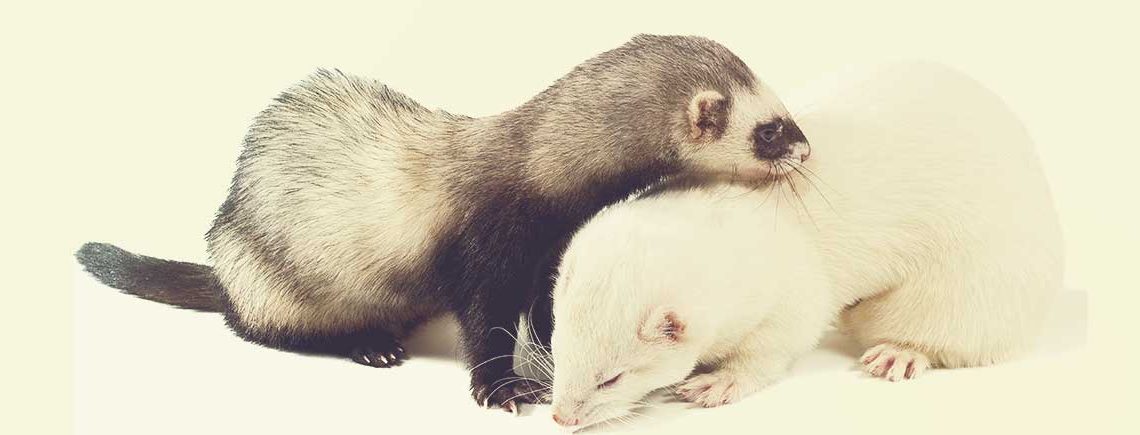Popular Small Pets – Ferrets
Choosing a Small Pet: What You Need to Know About Ferrets
Ferrets are wonderfully interesting pets, but there are many different things to consider when finding the newest member to your family, so how do you know that a Ferret is right for yours? Like any pet, a Ferret will require lots of love and care to help keep them healthy and well, so in this blog we are taking a look at Ferrets, and what you can expect if you were to have a one as a pet.
Ferrets are lively, intelligent animals that enjoy company and can be extremely entertaining. They are also easy to train and can become tame and very interactive pets; but they will need you to spend a lot of time with them in the beginning so that they come to know you as a friend.
Sociable animals, Ferrets prefer not to live alone and should be kept with other ferrets.
Lifespan
The average lifespan for a Ferret is between eight and ten years.
Company for Ferrets
Ferrets are playful, so they like to have interaction and lots to do. They do like to have company; therefore, if you want to introduce a new ferret it is best to do so when they are young, rather than as adults; in order to minimize fighting. In addition, introductions should also be made gradually.

Where Ferrets Like to Live
Ferrets can be kept indoors or outdoors provided the housing is dry, draught free and out of direct sunlight. However, because they are active animals, their home will need to be large as possible and include multiple levels for playing; and a separate area for sleeping in. Each Ferret will need its own bed. A layer of sawdust should be used to cover the base of the cage. Ferrets that are kept indoors will need an outdoor run so that they can get enough daily exercise.
Exercise & Play for Ferrets
Ferrets need a lot of exercise, to help burn off fat and protein. This can be easily achieved by letting them run around in a pen; but if you don’t have a pen, they will need supervised time outside their cage for at least two hours a day. Ferrets require constant monitoring for safety as they are always looking to explore and try new things. If outdoors, your Ferret should be kept in its pen, or on a leash.
Diet & Nutrition for Ferrets
Ferrets are meat eaters and require a diet high in proteins and fats; because they burn a lot of energy with their constant movement. Their food should contain a high content of meat and specialist blended foods that are available to help ensure a balanced diet.
Treats such as fruit can be given occasionally as training rewards for them.
In addition, clean, fresh drinking water and food should be available for your Ferrets at all times.
Health & Hygiene
A healthy balanced diet and hygienic conditions will help keep your ferret in good health. A healthy, happy Ferret will:
- Be bright and alert
- Have a glossy coat with no bald patches
- Be able to move around the cage easily
- Have a clean nose and mouth, as well bright eyes
Vaccinations
Your Ferret should be vaccinated against Distemper. Regular boosters will be required to help ensure your pet does not come into contact with this disease.
Worming + Flea Control
Your Ferret should be wormed regularly with a proprietary worming preparation. Regular flea treatment will be needed to prevent fleas and other skin parasites too.
Neutering or Spaying
There are a number of different reasons to neuter [males] or spay [females] your Ferret. Both are surgical procedures which will prevent your ferret from reproducing. It is advisable to get your ferret neutered. It can be fatal for a female Ferret to repeatedly come into season and be mated with. The male Ferret can be neutered once they get to four months.
Benefits of Neutering and Spaying:
- Spaying female Ferrets does prevent illnesses, and possibly death, caused by excessive heat
- Neutering male Ferrets does prevent the smell that emanates from them
- It also cuts out the nipping and biting
Grooming
Regular grooming will help keep your Ferret healthy, but it will also allow for a bond to be created between the owner and the pet. Your Ferret should be groomed at least once a week with a soft brush or a grooming glove.
Ferrets also need baths because they have an odour caused by their scent glands. It is recommended that you bathe your Ferret once a month using a deodorizing shampoo; but keep it away from your Ferret’s eyes and genitals.
Cage & Litter box
Your Ferret’s cage should be cleaned out at least once a week using a pet safe disinfectant. Ferrets can be trained to use a litter box in a couple of weeks. Ferrets are naturally attracted to smell, so place a few fresh droppings into the ferrets litter box to start off, along with some cat litter. When the ferret wakes and after it eats you will need to put them into the litter box.
The litter box should be available at all times for the Ferret and in a specific corner, and should be cleaned daily.
Take Me Home Checklist
When to take your Ferret home, you will need make sure you have some things to in order to help keep them healthy and happy. We’ve put together a simple ‘Take Me Home’ checklist for new Ferret owners. If you have any questions, or need any further advise, please drop in to your local Petmania and talk to our Petcare Advisors.
- Cage (Wire with base)
- Ferret Food
- Water Bottle & Food Bowl
- Litter Box & Litter
- Toys
- Bedding (wood shavings)
- Ferret book
- Ferret shampoo
- Vitamin supplements

